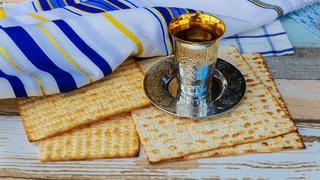Breaking (Unleavened) Bread: How Passover and Easter Can Inform Interfaith Friendship

On Sunday, April 21, Christians around the world will observe the most significant holiday on their liturgical calendar: Easter, the celebration of the resurrection of Jesus Christ. At the same time, as is often the case, those in the Jewish faith will be in the midst of celebrating a major holiday in Passover, the eight-day commemoration of their ancestors’ liberation by God from slavery in Egypt.
The intersection of the two holidays is far from a coincidence, according to Philip Cunningham, Ph.D., co-director of Saint Joseph’s Institute for Jewish-Catholic Relations (IJCR).
“Passover is a central part of the story of Christ,” Cunningham explains. “In the Gospels, Jesus has the Last Supper with his apostles, prays at Gethsemane, is arrested, crucified and buried all at Passover time. Additionally, his passage from the bondage of death to the freedom of life was seen by the earliest Jewish followers as His own personal Passover.”
Just because the holy days share a common history, though, does not mean that the connection has always been viewed through a friendly lens.
“For centuries in Europe, the Easter season was dreaded by Jews as an occasion when the Christian majority would label them ‘Christ killers’ and provoke violence against them,” Cunningham shares. “This notion has been absolutely repudiated by the Catholic Church ever since the Second Vatican Council. Instead, and more positively, the two feasts mark the respective foundational moments for both faith traditions.”
The IJCR is using the reformed relationship between the holidays as an opportunity to teach each community about the other. On Sunday, April 7, the Institute hosted a Passover Seder, a fully catered kosher meal, to bring the groups together.
“Because of the Seder's focus on teaching and the lively, participatory rituals, many Jews have increasingly welcomed non-Jewish guests to their yearly meals,” Adam Gregerman, Ph.D., co-director of the IJCR, says. “While unthinkable in the past, in the present such openness to outsiders reflects the remarkable changes in interreligious relations that have occurred over the last few decades.”
“The Passover Seder at SJU is an opportunity for Jews to share with Christian friends a ritual that is at the heart of their religious tradition,” Cunningham says. “For Christians, it is an occasion to viscerally experience a religious tradition with which we are so closely related spiritually and historically.”
